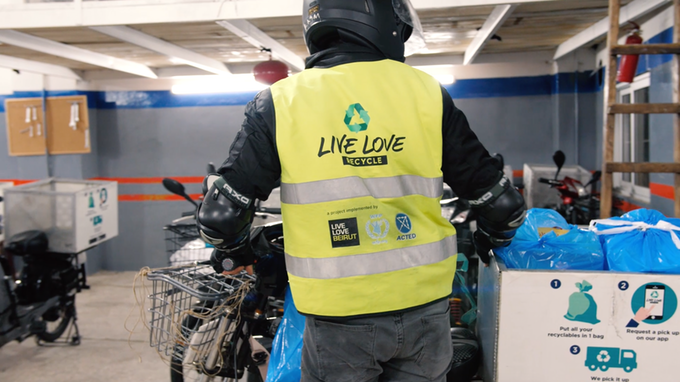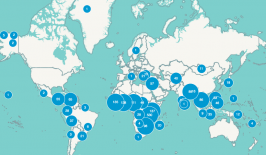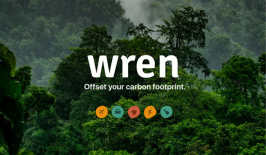Live Love Recycle is a grassroots organisation providing an ultra-convenient, free, on-demand recycling service to the city of Beirut – and employment opportunities to hundreds of its residents.
While developing effective recycling systems are a challenge for any large urban centre, Beirut has faced significant problems when it comes to what to do with the city’s waste. While many residents are eager to recycle their waste and ease the burden on local landfills, it’s not an easy task. There are recycling centres available but the city authorities haven’t provide residents with reliable collection services. That’s where Live Love Recycle comes in – linking residents and recycling facilities through a mobile app.
All Beirut residents have to do is put their recyclables into a bag, request a pick up on the app, and one of Live Love Recycle‘s e-bike drivers will come over within half an hour to pick them up and take them to the nearest sorting facility. The materials that they will accept are determined by the local facilities – currently that includes paper, plastic and metal products. And right now, the whole service is completely free.
The story of Live Love Recycle
The Live Love Recycle app was developed in 2015 during Lebanon’s so-called “waste crisis”. When the main landfill site in southern Beirut was closed by authorities, and no other alternatives were provided, garbage began to pile up in the streets, sparking protests and a public health concern. Georges Bitar, a young Lebanese entrepreneur, decided to tackle the city’s waste challenge himself. He did a test run of the idea using Uber, where people would call a cab to come and pick up their bags of recycling. After being inundated by requests from people who wanted to use the service, they decided they needed to purchase their own collection vehicles to scale up the organisation.
They developed partnerships with a French NGO called ACTED and the United Nations World Food Programme to help fund the project, but it wasn’t until they received funding from Germany’s Federal Ministry of Economic Cooperation and Development (BMZ) in 2018 that operations really got started in full force. That funding allowed them to purchase a fleet of electric vehicles including 55 electrical bikes, 4 electric tuk tuks, and one electric truck.
Within only two years of operation, LiveLoveRecycle collected 40,581 bags of recyclables from 4,111 households in Beirut – saving 100 tons of waste from ending up in open pit dumps, burnt, or in the ocean.
“Even the presidential palace recycles with us,” says founder Georges Bitar.
While they do raise some revenue from selling the recyclables to various local recycling facilities and through advertising, which helps cover part of their expenses, when the BMZ funding ended in 2019, LiveLoveRecycle decided to start a crowdfunding campaign in order to stay in operation. They raised around 70,000 USD from the crowdfund which, as founder Georges Bitar told RESET, “proved that people are willing to pay for the service. In fact more than 60% of our customers are tipping our drivers.” So far they have chosen to keep the service free in order to raise awareness about recycling, but in the future they plan to charge a small fee of less than 1 USD per collection. Currently they are working on integrating a payment function into the application.
Over their two years of operation, they have trained and employed hundreds of people who were in need of a job, including many from low-income refugee communities. They even employ a team of cooks who supply their drivers with homemade food. In Lebanon, 1 in 6 people is a refugee, and unfortunately the country currently suffers high rates of unemployment (up to 37% for youth under the age of 25).
What’s next for LiveLoveRecycle?
LiveLoveRecycle’s team has been talking with the minister of environment and the municipality of Beirut, looking to expand their operations, but these collaborations are currently halted due to the current political instability in Lebanon.
They’re also working with The Village Talent Incubator, an accelerator program in Aix-en-Provence, to replicate the Live Love Recycle system in France. “We are trying to replicate our idea in France because we realized that recycling is not only an issue in Lebanon. More than 2 billion people in the world don’t have access to a recycling collection service and more than 90% of the plastic in the world is not being recycled,” says Georges.
Live Love Recycle contributes to sustainable waste management in Lebanon in myriad ways. “It gives people an easy way to learn how to sort their recyclables and properly dispose of them, it gives decent jobs for people in the recycling field instead of searching in the bins for recyclables and it gives the sorting facility a way to increase ‘urban mining’ and collect clean and well-sorted recyclables.”
The interactive application has an educational aspect too, teaching users how to sort their waste and raising awareness about the environmental benefits of recycling. It also provides useful data on pick-up locations, which helps the team plan their services more efficiently. Eventually this data could be used to place public recycling bins in strategic locations, streamlining and optimising waste management services.
Georges is confident that the LiveLoveRecycle model can help tackle the global recycling issue. We are equally excited to see their idea grow.





